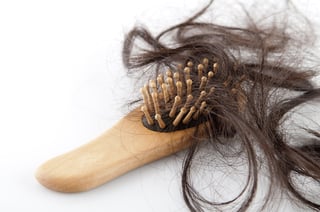
Post menopausal hairloss occurs in about 50% of women by age 50.
Alopecia that occurs in menopause is a type of late onset Female-Pattern Hair Loss or FPHL. This can be broken down into two categories, early onset (20-30 years old) and late onset (40 - 60 years old).
Alopecia is one of the many menopausal signs and symptoms and although extremely common, is often overlooked. It can occur at the onset of premenopause but most often 5-10 years into menopause.
I get new patients each week who are concerned about hair loss. Not only do they struggle with autoimmune conditons, but they are deeply impacted in their sense of self by this issue. It's not just a vanity issue - it has psychological reverberations. Hair loss changes how you look at yourself. Most women with significant hair loss feel rejected before they even leave the house. They avoid mirrors, wear hats and become socially akward about their appearance.
Early intervention is important because the longer the condition continues the more invasive the treatment has to be. Women are encouraged to act as soon as they feel as though they are losing more hair than usual.
Two commonly known triggers of abrupt hair loss are exposure to stress and surgery. These are triggers for a type of hair loss called telogen effluvium. It is common for women to start experiencing this 2-4 months after a stressful event or surgical procedure. This sometimes makes it hard for the patient to connect the dots to the cause of the hair loss. And this is different than hair loss after pregnancy because your hormones are doing cartwheels.
Along with stress, alopecia can be triggered by genetics, inflammation and hormonal imbalance. Both a hyper- and hypothyroid can affect hair follicles and trigger alopecia. A diagnosis of autoimmune thyroid can further compound the diagnosis of alopecia. Elevated reverse T3 may indicate elevated cortisol levels and should be confirmed with the salivary testing.
Menopausal alopecia is the result of a slow decline in hormone output. Typically when a woman stops menstruating and becomes free of hot flashes it is assumed that she is finished with menopause.
Decline of estrogen and progesterone typically occurs over time as ovarian function diminishes. Both hormones play a role in hair follicle health. Estrogen promotes hair growth in the anagen phase, leading to thicker healthier, faster growing hair. Progesterone inhibits 5-alpha reductase, thereby blocking the negative effect of testosterone on the hair follicles. There may be a gradual increase of testosterone and adrenal hormones which promote an androgen-induced alopecia. Androgens bind to the the hair follicles and force them to go into telogen resting phase sooner than is normal. They shrink the hair follicles causing them to grow back thinner with each cycle and could ultimately lead to follicle death.
Studies have shown that topical melatonin increased skin cell growth and support of anagen growth phase. Rosemary oil has been shown to enhance circulation in the scalp.
What are some natural treatments to regrow my hair?
- Drink 2-4 cups of green tea daily.
- Eat natural 5 alpha-reductase inhibitors like: dark berries - blueberries, pomegranates, strawberries and raspberries because these foods inhibit protein kinase C.
- Herbs like: Trifolium, Pueraria, Panax ginseng, Curcuma aeruginosa and Polygonum multiflora can be used topically and internally to inhibit 5 alpha-reductase. Ask me about a supplement form that is easy to take.
- Towel dry your head vigorously each day and do a scalp massage with Weleda's Rosemary oil.
- Take Xymogen's Adrenal Manager and AdrenaMax.
- Take 2 caps of Xymogen's Regenemax Plus with 12,000 mcg of biotin - the only supplement that has passed double-blind studies for hair regrowth.This is the best supplement for hair re-growth that I have used clinically.
How to be Healthy after Menopause


